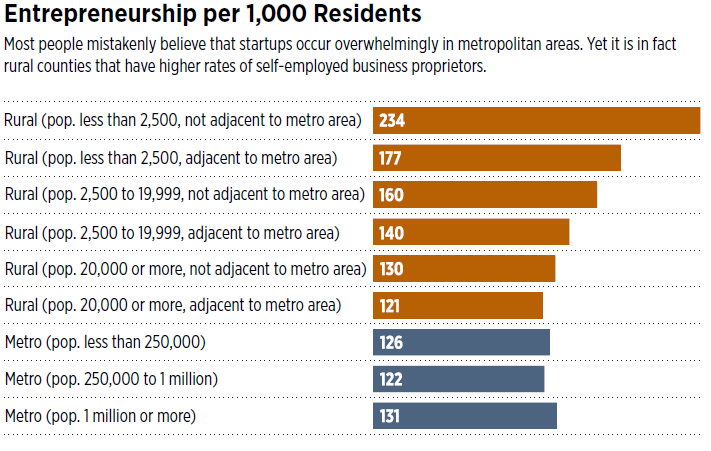This article includes information from Investing in Rural Prosperity. For rural economic development insights from 79 authors across the US and abroad, download your free book.
Despite a decline in new business starts over the past decade, entrepreneurship represents the best chance for rural economies to grow in the future. Fortunately, many organizations in rural areas are helping entrepreneurs start and expand businesses. However, entrepreneur support organizations themselves require a supportive environment to effectively assist existing and aspiring business owners. Therefore, focused, long-term investments in a supportive environment for entrepreneurs and the organizations that support them are crucial to advancing economic prosperity in rural communities.
The importance of rural entrepreneurs
In many ways, entrepreneurs are the life blood of a community’s economy. Entrepreneurs start new businesses that build new local industries or expand existing ones. Along the way, many entrepreneurs hire others in their community, creating new jobs. This constant churn of pursuing new ideas and opportunities keeps communities vibrant.
This is particularly true in rural communities, where small businesses and entrepreneurs have long been important. When many people think of entrepreneurship, they likely think of startup companies in Silicon Valley. However, by some measures, entrepreneurship is highest in the most remote rural communities.
Figure
Rural counties have higher rates of self-employed business proprietors than metro areas.

Unfortunately, rural entrepreneurship has been declining in recent years. In every year between 2008 and 2018, more firms closed than opened in rural areas. In fact, there were fewer rural firms active in the United States in 2018 than at any time since 1987. This decline in rural entrepreneurship is consistent with broader trends nationwide.
Preliminary analysis of data from 2020 and 2021 by Daniel Newman and Kenan Fikri indicate this slowdown in entrepreneurship may have reversed during the COVID-19 pandemic. However, it is too early to tell if these changes will last. Either way, healthy levels of entrepreneurship remain critical to the future of rural America.
Efforts to support rural entrepreneurs
Luckily, many organizations across the country are effectively supporting rural entrepreneurs.
One example comes from Mississippi, where Higher Purpose Co. (HPC) is supporting Black entrepreneurs, artists, and farmers. One of the ways HPC assists its entrepreneur clients is by helping them shop for the right type of financial support for their business. HPC does this by coordinating interactions between business owners and multiple financial institutions. They also provide assistance by helping organize and review all documents related to the business’s funding requests to ensure they are properly prepared.
HPC also helps entrepreneurs in other ways. For example, by providing no- or low-cost support for marketing, accounting, legal, credit repair, and mental health counseling services. In addition to working directly with entrepreneurs, HPC is dedicated to changing the narrative about what is possible for Black people in the South. Through the Institute for Black Entrepreneurship, HPC is working to expand conversations on civic engagement, policy, and systemic solutions for creating economic opportunities for Black residents in Mississippi.
Photo
Higher Purpose Business Fellowship pop-up graduation

Another example of an organization supporting rural entrepreneurs comes from Maine where Coastal Enterprises, Inc. (CEI) supports refugee or immigrant entrepreneurs. Through its StartSmart program, CEI provides “no-cost, confidential, and linguistically and culturally sensitive business advice.” In addition to offering customized business advice, CEI also supports the financing needs of local businesses. One of the financing tools they use, for example, is a Sharia-compliant financing product tailored to the unique needs of Muslim entrepreneurs.
Like HPC, CEI is dedicated to reducing barriers to rural entrepreneurship. For one of their clients, this meant working with the Maine Legislature to change hair braiding licensing requirements. As a result of their efforts, individuals can now offer hair braiding services without having a cosmetology license, making it easier to start a new business in this line of work.
Lessons on creating a supportive environment for rural entrepreneurs
Initiatives like HPC’s and CEI’s do not occur in isolation. The effectiveness of efforts like these depends on the broader environment in the community, often called the “entrepreneurship ecosystem.” Fortunately, we know the critical factors of a strong entrepreneurship ecosystem. They are things like those outlined in a recent blog by Dell Gines of the Federal Reserve Bank of Kansas City. Things like strong relationship networks, access to credit and capital, and good community infrastructure.
We also have insights into how to implement those critical factors in rural communities from experts like Steve Radley, CEO of NetWork Kansas, and Don Macke, Vice President of e2 Entrepreneurial Ecosystems. These include, among other things:
• passionate and committed local leaders,
• sustaining effort over time even in the face of crises,
• building capacity in the community,
• recognizing diversity as an asset, and
• pursuing regional development.
An invitation to start
Investing in and supporting entrepreneurship ecosystems can lead to the growth of additional entrepreneurial activity in a community. More entrepreneurial activity can lead to job creation, economic development, and, ultimately, community vibrancy, making the community a more attractive location. This can lead to more investment of resources and energy, which helps create a stronger, more resilient entrepreneurship ecosystem.
Over time, this virtuous cycle can take on a life of its own. That is what happened in Ord, Nebraska, which invested over years in its entrepreneurship ecosystem. Ord vastly outperformed its peers in creating jobs through entrepreneurial enterprises between 2000 and 2018. More information on the efforts of community leaders in Ord and the results they achieved can be found in a recent chapter of Investing in Rural Prosperity, a book published in 2021 by the Federal Reserve Bank of St. Louis, in collaboration with the Board of Governors of the Federal Reserve System.
It takes active and committed local leaders to get the cycle started. So, what are you waiting for?
Views expressed are those of the authors and do not necessarily reflect those of the Board of Governors of the Federal Reserve System.








